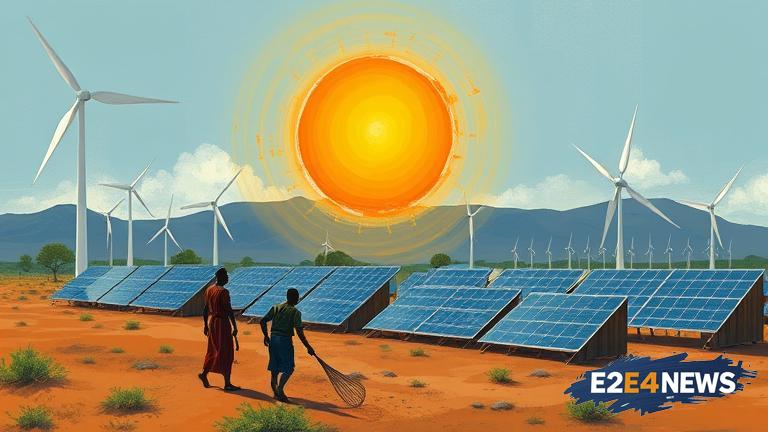Africa has been witnessing a significant shift towards renewable energy in recent years, driven by the need to reduce dependence on fossil fuels and mitigate the impacts of climate change. The continent is endowed with abundant renewable energy resources, including solar, wind, hydro, and geothermal energy. Many African countries have set ambitious targets to increase their share of renewable energy in the energy mix. For instance, South Africa aims to generate 42% of its electricity from renewable sources by 2030. Similarly, Kenya has set a target of generating 70% of its electricity from renewable sources by 2030. The use of renewable energy in Africa has numerous benefits, including reducing greenhouse gas emissions, improving air quality, and enhancing energy security. Moreover, renewable energy can create jobs and stimulate local economies. The cost of renewable energy technologies, such as solar and wind power, has decreased significantly in recent years, making them more competitive with fossil fuels. This has led to an increase in investments in renewable energy projects across the continent. In addition, many international organizations and countries are providing financial and technical support to African countries to help them transition to renewable energy. The African Development Bank, for example, has launched a number of initiatives to support the development of renewable energy in Africa. The bank has also established a fund to support the development of renewable energy projects in Africa. Furthermore, many African countries are promoting the use of renewable energy through policies and regulations. For instance, some countries have introduced feed-in tariffs, which require utilities to purchase renewable energy at a fixed price. Others have introduced tax incentives and other forms of support to encourage the development of renewable energy projects. Despite the progress made, there are still significant challenges to be addressed. One of the major challenges is the lack of infrastructure, including transmission and distribution lines, to support the integration of renewable energy into the grid. Another challenge is the lack of access to financing, particularly for small-scale renewable energy projects. Moreover, there is a need for capacity building and training to ensure that African countries have the necessary skills and expertise to develop and maintain renewable energy projects. To address these challenges, African countries need to work together to share knowledge, expertise, and best practices. They also need to engage with international partners to access financing and technical support. In conclusion, Africa’s renewable energy revolution is gaining momentum, driven by the need to reduce dependence on fossil fuels and mitigate climate change. While there are still significant challenges to be addressed, the benefits of renewable energy are clear, and the continent is well on its way to becoming a leader in the transition to a low-carbon economy. The use of renewable energy in Africa has the potential to create jobs, stimulate local economies, and improve energy security. It is essential that African countries continue to work together to promote the use of renewable energy and address the challenges that lie ahead. With the right policies, regulations, and support, Africa can unlock its vast renewable energy potential and become a model for sustainable development. The future of renewable energy in Africa looks bright, and it is essential that the continent continues to invest in this sector to ensure a sustainable and prosperous future. The development of renewable energy in Africa is a complex issue that requires a multifaceted approach. It involves not only the development of new technologies but also the creation of policies and regulations that support the use of renewable energy. Moreover, it requires the engagement of local communities and the private sector to ensure that the benefits of renewable energy are shared by all. In addition, it is essential to address the social and environmental impacts of renewable energy projects to ensure that they are sustainable and equitable. The use of renewable energy in Africa has the potential to reduce poverty and improve living standards. It can also help to promote economic development and reduce dependence on imported fuels. Furthermore, it can help to mitigate the impacts of climate change and improve energy security. In order to achieve these benefits, it is essential that African countries continue to invest in renewable energy and work together to address the challenges that lie ahead. The African Union has launched a number of initiatives to promote the use of renewable energy in Africa. These initiatives include the development of a continental renewable energy policy and the creation of a fund to support the development of renewable energy projects. The African Union has also established a number of partnerships with international organizations and countries to support the development of renewable energy in Africa. These partnerships include the African-European Union Energy Partnership and the Africa-India Forum on Energy. In conclusion, the development of renewable energy in Africa is a critical issue that requires a multifaceted approach. It involves not only the development of new technologies but also the creation of policies and regulations that support the use of renewable energy. Moreover, it requires the engagement of local communities and the private sector to ensure that the benefits of renewable energy are shared by all. With the right policies, regulations, and support, Africa can unlock its vast renewable energy potential and become a model for sustainable development.
